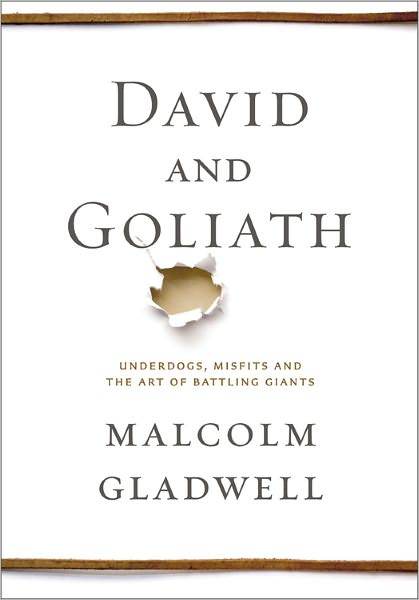Malcolm Gladwell battles giants in ‘David and Goliath’
By Korea HeraldPublished : Oct. 24, 2013 - 18:51

By Malcolm Gladwell
(Little, Brown and Co.)
The dose makes the poison, as Paracelsus, the father of toxicology, is supposed to have said. A glass of water is good for you; an ocean’s worth can be fatal.
That’s the underlying message of Malcolm Gladwell’s new exercise in raconteurship, “David and Goliath: Underdogs, Misfits, and the Art of Battling Giants.” The book is ostensibly about how underdogs can win, but for great stretches readers will find it hard to recall this premise, made explicit at the outset and then only intermittently. Instead the book’s tales seem united more by the law of diminishing returns, which states that more is not always more, and taken too far can even yield less.
Not to worry; Gladwell is a fine storyteller. As in such popular works as “The Tipping Point” and “Blink,” the pages whiz by in a blur of narratives that often are enlightening and diverting, if not always relevant or persuasive.
You’ll learn in this book that Goliath probably suffered from acromegaly ― excessive growth hormone ― as a result of a pituitary tumor, and that a stone fired by someone skilled at slinging them might reach 150 miles per hour. You’ll discover that a clever three-question quiz is almost as effective at gauging a person’s basic cognitive ability as more traditional intelligence tests. And you’ll marvel at some of the hugely successful entrepreneurs who have overcome ― or been enabled by ― dyslexia, including the founders of Virgin Air, JetBlue, Charles Schwab, McCaw Cellular and Kinko’s.
Gladwell’s stories, while counterintuitive, are nevertheless deeply reassuring. In “David and Goliath,” we are told, the little guy has a much better chance of besting the big bad giant than most of us would think. Power fails if it lacks legitimacy. Revenge is counterproductive. Forgiveness is divine. There is little, in other words, that will discomfit the reader.
Nor is there anything much on the question of how exactly to distinguish David from Goliath. Is size the only valid gauge? Or is it really all about expectations? Should tactics or intentions matter?
David can beat Goliath, and it’s instructive when he does. But mostly Goliath triumphs, at least until times change or he crumbles with age or another, bigger Goliath comes along to knock his block off. And when some David does defeat the juggernaut, it suggests that perhaps we didn’t have a very clear understanding of which was which in the first place. (MCT)
-
Articles by Korea Herald



![[Exclusive] Korean military set to ban iPhones over 'security' concerns](http://res.heraldm.com/phpwas/restmb_idxmake.php?idx=644&simg=/content/image/2024/04/23/20240423050599_0.jpg&u=20240423183955)

![[Graphic News] 77% of young Koreans still financially dependent](http://res.heraldm.com/phpwas/restmb_idxmake.php?idx=644&simg=/content/image/2024/04/22/20240422050762_0.gif&u=)



![[Pressure points] Leggings in public: Fashion statement or social faux pas?](http://res.heraldm.com/phpwas/restmb_idxmake.php?idx=644&simg=/content/image/2024/04/23/20240423050669_0.jpg&u=)










